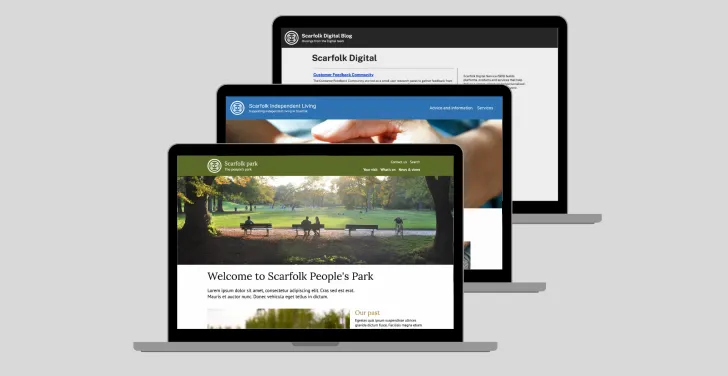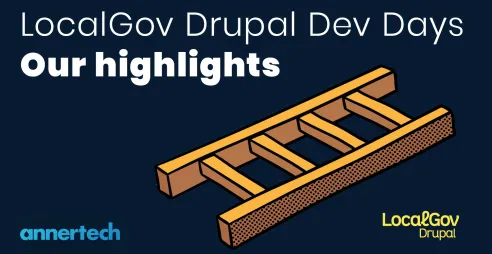New LocalGov Drupal Features that you may have missed

LocalGov Drupal, the CMS for councils by councils, is constantly changing as new features are being added. These are the latest additions to this fantastic project, contributed by the community of councils that have joined.
HTML Publications module
This is the module that really excites the content managers among us. It finally gives councils the opportunity to ditch PDFs and documents.
These file types are popular among councils, but they’re clunky to use and pose accessibility challenges. It requires a fair amount of effort to create reasonably-accessible PDFs, and even then they aren’t ideal.
The other aspect is that on mobile (which the majority of users access sites on) PDFs are tiny and hard to read – you need to constantly zoom and swipe.
Thanks to Hammersmith and Fulham Council, Newcastle Council, Chicken, Agile Collective, Annertech and others for this work.
Alpha release module for subsites
A subsite can be used to create a section, campaign or microsite within the site. It allows a flexible layout and a bespoke visual identity. This alpha release module, Subsites Extras, allows for extra individual designs for different subsites, so get those creative juices flowing.
This is a great example of open source collaboration in practice. This module was developed via collaboration between Essex County Council, Hammersmith and Fulham Council, Chicken and Annertech.
Updates to Microsites base theme
Small bugs were fixed here. We’ve had lots of minor improvements to the Microsites Base theme, enabling easier management of the layout of items in the header, better support for theme developers adding debugging code, and some new fonts – including the very popular and accessibility-focused font Lexend.
Microsites platform alpha release version 4
The microsites platform is almost ready to release version 4. This is a major new release which will move us away from using Drupal’s Domain Group module – and a lot of extra code that we had to write to use it – and towards using the Group Sites module which was created specifically for a microsites use case.
There will be no new major features in version 4 on its initial release, just feature parity with version 3. But more importantly there will be an upgrade path, so upgrading from version 3 to 4 should be as simple as adding the new code and running the upgrade script.
Thanks so much especially to Agile Collective and Open Code for all the work they are doing on this.

Working group to make events better
Events in LocalGov Drupal have always been quite simple affairs in that they are all placed within the same section of the website. There has never been the concept of “event channels” for councils to have business events, arts events, etc all listed in their own specific areas of the site, like we do for newsrooms and directory channels.
There is now a working group to address this and bring events (hopefully) into the directories ecosystem. This will mean we can have event channels and use all the goodness of directory facets alongside events.
It is early days for this working group, but the signs are good, especially with such a great team working together on it - namely Essex County Council, Hammersmith and Fulham Council, Chicken and Annertech.
New Content Access By Path feature
Do you have guest editors, people who write blogs about a specific topic, or those who would just be editing content for a specific department? This feature allows you to allocate access to specific users, as needs be. I created it, and it was funded by Essex County Council. It's available on Drupal.org.
Weekly Planning Notices
Carlow County Council funded a module that creates a content type and list for the weekly planning notices that all Irish councils are legally required to publish on their websites. This module, which was developed by Annertech, allows these notices to be posted in Irish, boosting the crucial multilingual functionality of LocalGov Drupal sites.
The feature gives the council an easy way to add and manage these notices, and for users to be able to filter the notices by year and week number.
Conclusion
There are 44 live council websites built on LocalGov Drupal, and more are in development. Its philosophy of build to share resonates with public sectors, who save time and money by pooling their resources, and new features, based on the real-world needs of councils, are being developed all the time.
Drupal is now the most popular CMS among councils in Ireland and the UK, according to the latest updates to the LocalGov CMS Directory (which lists the content management systems that councils use).
We’ll keep you updated with all the developments as LocalGov Drupal continues to evolve, offering valuable, excellent experiences for the users of these websites.

Are you ready to join the LocalGov Drupal community?
There are many reasons why Drupal is now the most popular CMS among councils in Ireland and the UK. These include money and time savings, features like the ones in this blog, and the fact that it’s created by councils for councils.
Find out what it can do for you


